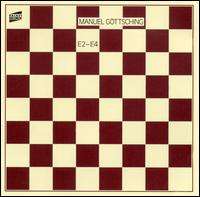E2-E4
| E2-E4 | ||||
|---|---|---|---|---|
 | ||||
| Studio album by Manuel Göttsching | ||||
| Released | 1984 | |||
| Recorded | December 12, 1981 | |||
| Genre | ||||
| Length | 58:40 | |||
| Label |
Inteam MG-Art (2001 reissue) | |||
| Producer | Manuel Göttsching | |||
| Manuel Göttsching chronology | ||||
| ||||
| Professional ratings | |
|---|---|
| Review scores | |
| Source | Rating |
| Allmusic | |
| Pitchfork Media | 9.2/10[2] |
E2-E4, released in 1984, is a solo recording by Ash Ra Tempel/Ashra guitarist Manuel Göttsching. The album consists of a minimalistic hour-long progressive electronic track that is subdivided into single tracks according to the stage of the song. The second half of the record is notable for Göttsching's guitar playing. The album is named after the most popular opening chess move 1. e2-e4 (which is expressed in long algebraic notation). A noteworthy pun on E2-E4 exists because the guitar is tuned from E2 (the low string) to E4 (the high string).
Pitchfork ranked it the 79th greatest album of the 1980s.[3] FACT magazine similarly ranked it the 4th greatest album of the 80s.[4] Thump also ranked it the 74th greatest dance album of all time.[5]
Track sections
- "Quiet Nervousness" - 13:00
- "Moderate Start" - 10:00
- "And Central Game" - 7:00
- "Promise" - 6:00
- "Queen a Pawn" - 5:00
- "Glorious Fight" - 3:00
- "H.R.H. Retreats (With a Swing)" - 9:00
- "And Sovereignty" - 3:00
- "Draw" - 2:40
Influence
The album was named as one of the best 1980s albums for its important role in the development of house and techno music of the late 1980s and early 1990s.[6][7] Sueño Latino sampled E2-E4 on its 1989 song "Sueño Latino."[7] In 1995, the German electronic music duo (and label) Basic Channel (Mark Ernestus and Moritz von Oswald) released a remix of E2-E4 titled "e2e4 Basic Reshape" on the BCD compilation album.
LCD Soundsystem's 45:33 recording from 2006 was inspired conceptually by E2-E4, as indicated by the accompanying artwork and the lengthy duration of the piece.[8][9]
References
- ↑ Bush, John (2011). "E2-E4 - Manuel Göttsching | AllMusic". allmusic.com. Retrieved 9 July 2011.
- ↑ Richardson, Mark (14 September 2016). "Manuel Göttsching: E2-E4". Pitchfork Media. Retrieved 14 September 2016.
- ↑ Staff, Pitchfork (November 20, 2002). "Top 100 Albums of the 1980s". pitchfork.com. Retrieved July 21, 2016.
- ↑ "The 100 Best Albums of the 1980s". FACT Magazine: Music News, New Music. Retrieved July 21, 2016.
- ↑ Staff, THUMP (July 14, 2015). "The 99 Greatest Dance Albums of All Time | Thump". Retrieved July 21, 2016.
- ↑ Pitchfork Feature: Top 100 Albums of the 1980s
- 1 2 Naylor, Tony (August 30, 2013). "Manuel Göttsching: the Göttfather". the Guardian. Retrieved July 21, 2016.
- ↑ Wasserman, Milo (April 19, 2016). "LCD Soundsystem: Complete Guide". Retrieved July 21, 2016.
- ↑ Pollock, David (May 11, 2016). "LCD Soundsystem – 10 of the best". the Guardian. Retrieved July 21, 2016.